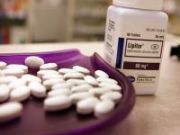The Effect of Statin Therapy on Kidney Function Following Acute Coronary Syndrome
Results from a recent study show that intensive statin therapy in patients with acute coronary syndrome does not increase the risk of kidney injury.

Results from a recent study show that intensive statin therapy in patients with acute coronary syndrome does not increase the risk of kidney
At the 2013 American Heart Association Scientific Sessions, Amy A. Sarma, MD, clinical fellow in medicine at Brigham and Women’s Hospital, Boston, MA, and colleagues presented data from two large clinical trials that looked the incidence of kidney injury among patients with acute coronary syndrome (ACS) treated with intensive versus moderate statin therapy.
Although the cardiac benefits are significant, the impact of statin therapy on the kidneys is dose dependent, and high-potency statin doses can cause acute renal failure.
For the study, the authors looked at data from the PROVE IT-TIMI 22 trial, which involved 4,162 patients with ACS who received either intensive (atorvastatin 80 mg daily) or moderate (pravastatin 40 mg daily) statin therapy. They also used data from the Phase Z portion of the A-to-Z trial, which involved 4,497 patients with ACS who received either early initiation of intensive statin therapy (simvastatin 40 mg per day for one month, followed by simvastatin 80 mg per day) or delayed initiation of less-intensive statin therapy (placebo for four months, followed by simvastatin 20 mg per day).
Researchers assessed serum creatinine at baseline in both trials and at several points during follow-up. The authors of the current study wrote that “incidence of kidney injury was adapted according to the Kidney Disease: improving global outcomes (KDIGO) classification with baseline creatinine as the referent. The incidence of adverse events (AEs) relating to kidney injury was determined through review of the AE database.”
In both study populations, serum creatinine increased from baseline for the first month of statin therapy, and then decreased. The authors reported that “Across both trials, the relative change in serum creatinine over time was the same between treatment arms. The incidence of kidney injury identified through creatinine elevation was similar between treatment arms in both trials.”
The authors also found there was no difference in either trial in the incidence of long-term serum creatinine increase between moderate- and high-intensity statin treatment.
According to the authors, “When data were combined across trials, the incidence of AEs related to kidney injury was similar for patients on intensive versus less potent statin therapy (0.92% versus 0.91%, P=0.97, respectively).”
Based on their analysis of the data, the authors concluded that “the use of intensive statin therapy did not increase the risk of kidney injury when compared to a less potent statin regimen” in patients who had ACS.